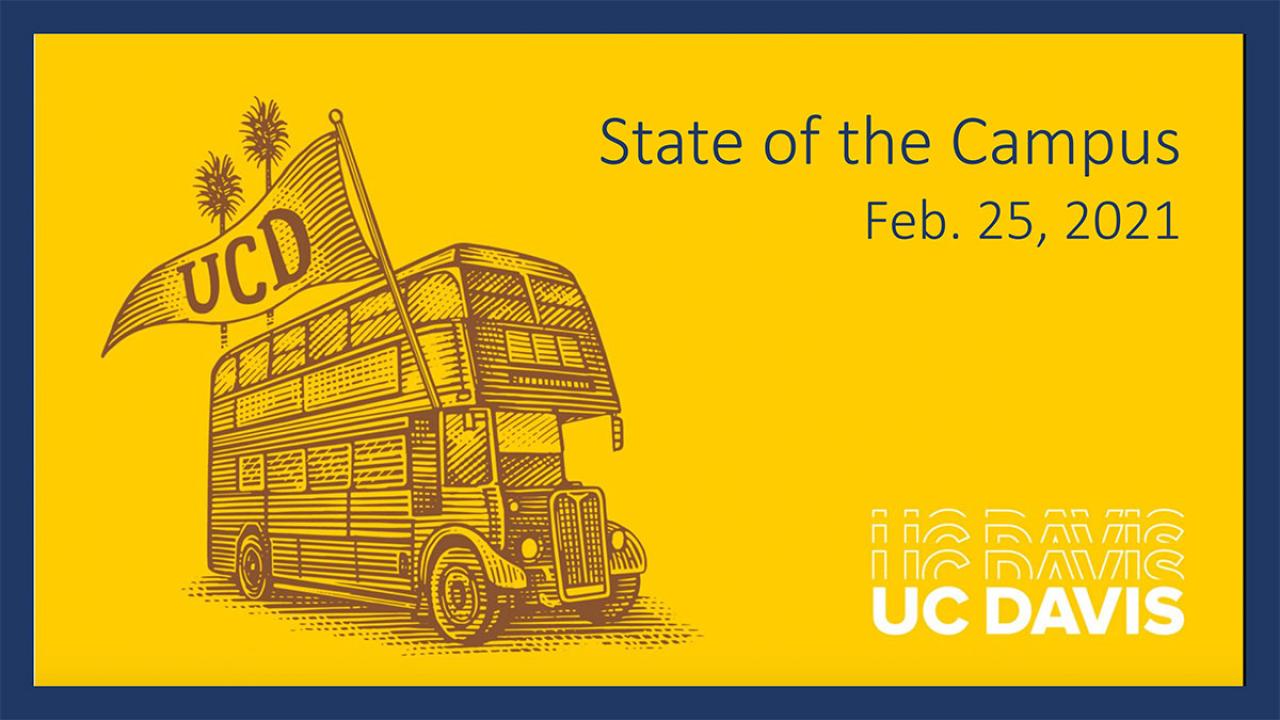
State of the Campus: 2021
Here are my prepared remarks for the 2021 State of the Campus, which I delivered the afternoon of Feb. 25 to the Representative Assembly of the Academic Senate:
Thank you, Richard. I hope everyone is staying safe and healthy in these historic times.
During last year’s State of Campus, who could’ve known that our world was just a few weeks away from turning upside down. But here we are now, almost a year to the day that Zoom meetings and remote work became the new normal.
SLIDE DECK
I’d like to commend everyone for your resilience and ingenuity. A lot has been asked of you since March of 2020, often on short notice. But you never failed to deliver. UC Davis’ mission of teaching, research and service moves ever forward with your dedication.
I’d especially like to commend the Academic Senate for your guidance and collaboration over the past year. From the COVID-19 pandemic to hazardous wildfire smoke, we’ve had to make significant and often complex changes to our campus operations. Thank you for your leadership and dedication that helps us navigate the challenges we face.
Together, we aren’t just surviving. We are thriving.
UC Davis in the national news
In fact, UC Davis is making national headlines like never before.
Both The New York Times and NBC News have featured UC Davis in recent days. Their stories covered Healthy Davis Together, our joint initiative between UC Davis and the city of Davis to prevent the spread of COVID.
The New York Times said: “Public health experts say the initiative is the most ambitious program of its type in the country and could be a model for other universities.
I’ll talk more about Healthy Davis Together and our COVID response in a bit. But overall, we can be proud. Our UC Davis community is stepping up and showing the value of being a highly-ranked research university with a world-class health system.
So our enterprise continues. And in times of great challenges, it’s clear that UC Davis never fails to show its strength.
Rankings
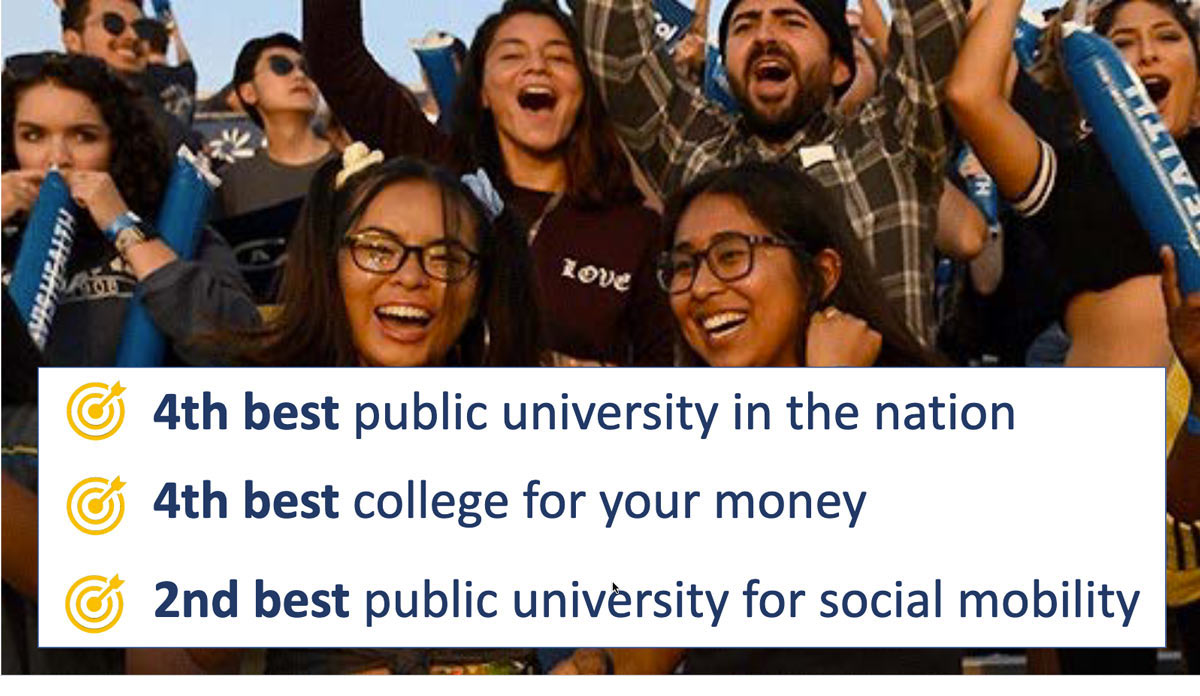
Despite all the disruptions we’ve faced in 2020, I’m encouraged that UC Davis continues to rise to the top.
For the second year in a row, UC Davis was ranked fourth in the country by Money Magazine for public universities. In these rankings of “Best Colleges for Your Money,” we remain in the Top 10 among all universities.
On top of these accolades, Washington Monthly ranked UC Davis No. 2 among the nation’s public universities for social mobility. This list recognizes “not what colleges do for themselves, but what they do for the country.”
In some cases, UC Davis is the top. We’re ranked No. 1 in the world for veterinary science by QS, one of the most influential providers of international university rankings.
UC Davis also places No. 1 in the country for agriculture in the Wall Street Journal/Times Higher Education rankings.
Overall, UC Davis maintained Top 5 rankings in 22 fields of study by the Wall Street Journal/Times Higher Education. Those include visual and performing arts, engineering and business management.
There’s no doubt that UC Davis is in the conversation as one of the best universities in the country. Through our dynamic and talented community, I’m confident that we’ll continue to rise even more.
Faculty honors
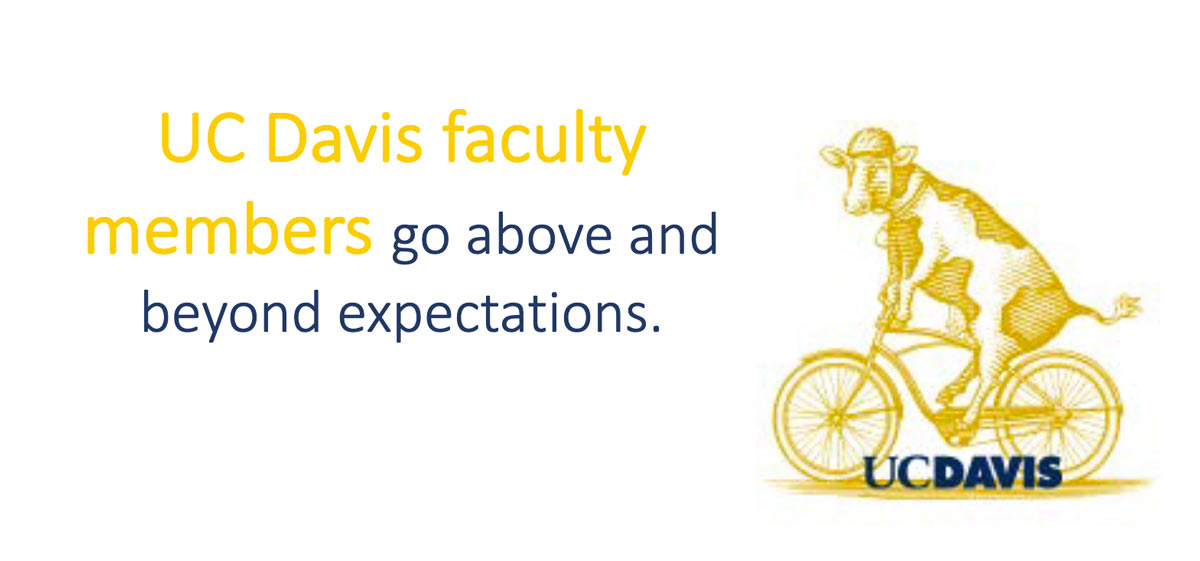
UC Davis’ outstanding faculty are helping lead the way. They are people like Ralph Aldredge, a professor of mechanical and aerospace engineering and associate dean for undergraduate education in the College of Engineering.
He was named recently as the recipient of the National Society of Black Engineers’ 2021 Golden Torch Award for Lifetime Achievement in Academia.
At UC Davis, he’s dedicated to increasing enrollment and retention of students from underrepresented minority groups. That includes work to expand access to freshman applicants from disadvantaged backgrounds.
Congratulations, Ralph.
They are people like Jann Murray-Garcia, a pediatrician and associate professor at the Betty Irene Moore School of Nursing.
She was named as the city of Davis’ 2021 C.A. Covell Award, which is also known as “Citizen of the Year.” Jann is regarded in the community for mentorship of high school students and dedication to social equity, especially in terms of public health.
And they are faculty members like Colin Milburn. He was named the inaugural recipient of the Letters and Science Dean’s Prize for Distinguished Contributions to the Liberal Arts and Sciences.
His research focuses on the intersections of literature, science and culture in digital humanities, science fiction and more. We appreciate his contributions to the liberal arts and sciences both at UC Davis and far beyond.
Research highlights
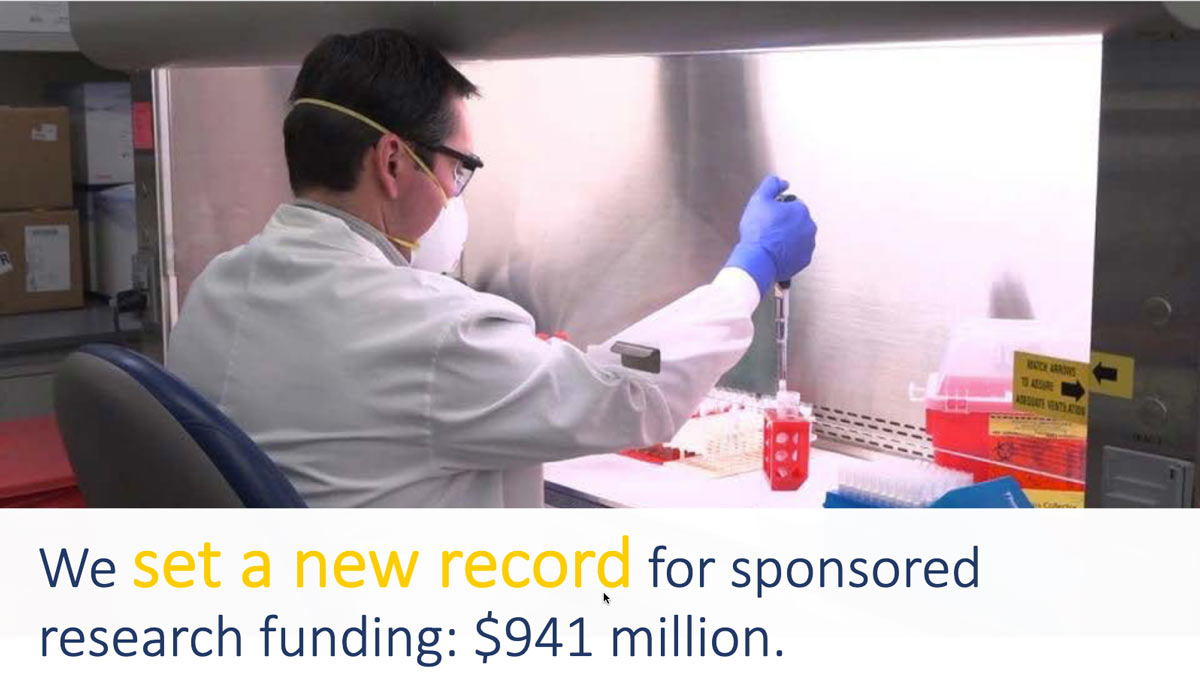
In terms of research, UC Davis is being sought more than ever to address some of the world’s most pressing issues, especially in the middle of a pandemic.
Over the past year, we set a new record for sponsored research funding, with more than $941 million in awards. That was a $94.5 million increase from the previous record set in 2018.
In terms of COVID, UC Davis has received 91 grants that have brought in $34.3 million in research funding since the pandemic started.
Our research and innovations have helped ramp-up COVID testing procedures, first in March when it was difficult for the public to get tests. UC Davis has since developed its own saliva-based testing, along with a test that can detect both COVID-19 and flu viruses at once.
UC Davis has also been instrumental in conducting research with COVID-19 vaccines. In August, UC Davis became the first in Sacramento to receive a vaccine candidate for COVID-19. It was part of a major clinical trial headed by Pfizer Inc. and BioNTech that involved 30,000 participants worldwide.
UC Davis has also conducted clinical trials with the experimental Novavax vaccine. This trial seeks to include up to 30,000 people, and prioritizes groups that have been most affected by COVID-19, including African Americans, Native Americans and other minority groups.
UC Davis is also conducting critical research on wildfires, an especially pressing topic over the last few years. Studies include the effects of these devastating fires on wildlife, forest management and air quality.
Professor Lisa Miller has researched the effects of wildfire smoke for over a decade. She specializes in respiratory disease and immunology and is researching the long-term effects of wildfire smoke, especially in its impact on children.
The UC Davis Office of Research also launched a Wildfires Research Work Group that includes more than 30 campus scientists. Their goal is to identify new research opportunities, build upon each other’s work and engage with policymakers and external partners.
Recruitments
In the meantime, we’re moving forward with key recruitments that will further strengthen the UC Davis team.
One of those is a search for Intercollegiate Athletics Director. Kevin Blue resigned from this position in December to serve as chief sport officer for Golf Canada.
We have some big shoes to fill here. Athletics thrived under Kevin’s leadership, including its first Big Sky Championship in football and four consecutive women’s basketball championships in the Big West.
He also remained focused on the academic success of our student-athletes. Kevin developed the Aggie EVO System — shorthand for “college evolution” — that included career preparation, leadership skills and internship opportunities.
I’d like to note that our student-athletes are excelling on and off the field. The UC Davis student-athlete Federal Graduation Rate (FGR) of 85.4 percent is among the highest in the nation for Division I programs. The national average is about 69 percent.
We’ve partnered with a national search firm to help identify potential candidates. The first round of interviews is expected to begin in March.
I’d also like to mention that executive recruitments are underway for three deans. Deans undergo a five-year review that’s standard for all full-time academic administrators. They have all done outstanding work and their leadership is very much appreciated.
Jennifer Curtis stepped down as dean of the College of Engineering, though she is returning to teaching and research in the Department of Chemical Engineering.
A national search is underway and interviews are expected to start in April. I’m hopeful that a final candidate will be identified by summer.
Michael Lairmore is stepping down as dean of our world-leading School of Veterinary Medicine in June. After a sabbatical, he intends to continue as a Distinguished Professor in the Department of Pathology, Microbiology and Immunology.
A national recruitment is underway and the first round of interviews is expected to begin in late April or early May.
Finally, we hope to identify a new dean for the College of Letters and Science by the end of this academic year.
Elizabeth Spiller stepped down last March to become executive vice chancellor for Academic Affairs at the University of Nebraska-Lincoln. Ari Kelman, an associate dean of the College of Letters and Science, serves currently as the college’s interim dean. Interviews for this role are expected to start in April.
The budget
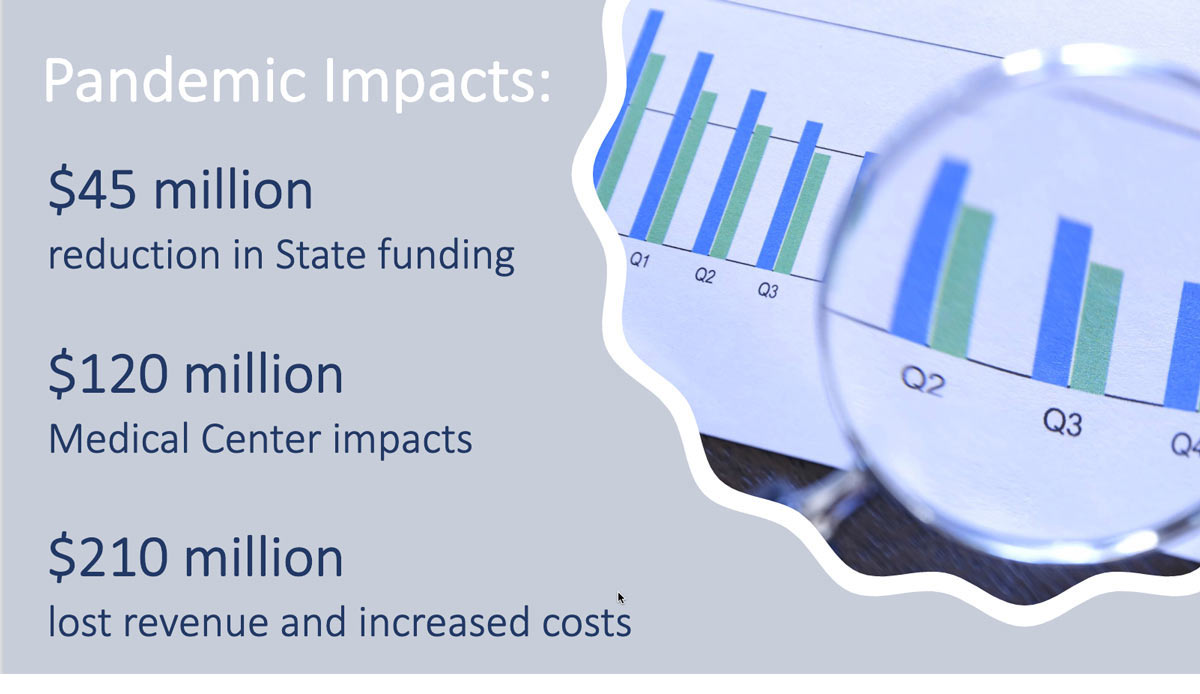
Now, I’d like to shift gears and focus on budget matters, which continue to be an area of great focus.
The total budget in 2020-2021 is $5.7 billion. However, these estimates were established before the full extent of the pandemic was clear, and we expect the final outcome to be lower for a number of categories. For example, the “Sales and Service, Auxiliary” includes our housing and dining enterprise, which is experiencing a significant decrease in revenue.
The primary “core funds” available for general university operations associated with our core instruction and research mission account for about 18 percent of the budget. They are composed of tuition and state unrestricted funding.
For 2020-2021, state appropriations and state unrestricted funds are estimated at $423 million. That’s a reduction of about $43 million compared to the previous year.
State funding is an increasingly small share of our resources, and it shrank again this year. It’s an important part of our resource as state funds and tuition are largely what we rely on for our teaching mission. However, the state has not been a reliable partner for many years now.
Tuition paid by students and their families has made up a greater share of our core funds for the past 10 years than what we receive from the state. This is why our budget framework focuses, in part, on rebalancing. We can no longer maintain the same costs on these sources.
Governor’s budget
Let’s take a look now at state funding.
UC Davis was contending with a budget gap before the COVID-19 pandemic. We had a multiyear plan to rebalance $80 million to $100 million from state and tuition funds over a four-to-five-year period, and this will continue.
With the onset of the pandemic our state funding was reduced by $45 million. Until a few days ago, we expected to have a larger ongoing budget challenge.
However, late last week President Drake and Chair Perez informed us that the governor and Legislature have agreed to a full restoration of last year’s budget reduction.
There were also significant short-term financial impacts from the pandemic. We are expecting pandemic-driven lost revenue and increased costs to exceed $210 million for the campus. The medical center has already seen a financial impact of over $120 million.
We are benefiting from federal relief funds and using them to address our pandemic response and losses. UC Davis received $33.8 million from the initial federal Coronavirus Aid, Relief and Economic Security Act, or CARES Act.
In December, UC Davis received an additional $50.9 million in federal stimulus funding. Separately, the medical center also receives federal aid designated for health care providers. Additional aid is under consideration in Congress.
Of the funds received, UC Davis used half of the initial CARES Act funds to provide Emergency Financial Aid Grants to eligible students. The campus also supplemented this program with institutional funding to ensure that our DACA students, who were not eligible for the federal aid, received similar grants. An additional $17 million from the December stimulus will be used for financial aid.
In November, President Drake asked all campuses to develop plans to address the fiscal impacts of the pandemic. Provost Croughan and I solicited campus input on some options for midyear action. After reviewing the input received and, taking into account federal stimulus funding, a then partial restoration of state funds proposed in the governor’s budget, and actions already taken across campus, Provost Croughan and I tabled these options.
Even with the recent good news, we will stay focused on the multi-year budget planning framework, which will require reductions and rebalancing efforts and hard decisions at all levels.
Our hope is to continue to use layoffs as a measure of last resort. But staffing will likely be reduced modestly in the coming years as we respond to the financial challenges. We will need the creativity, ideas, and spirit of shared sacrifice from the entire community.
Philanthropy
The good news is that philanthropy is thriving at UC Davis. Over the past fiscal year, we raised $252.9 million from 30,520 donors. That was the highest amount in UC Davis history.
And the gifts keep coming.
Earlier this month, we announced that an alumnus, Diane Bryant, gave $6.5 million to name the new Engineering Student Design Center.
The Diane Bryant Engineering Student Design Center is currently under construction and scheduled to open in fall 2022. It will allow students from all disciplines to discover the power of design through rapid prototyping, 3D printing, and an incredible range of physical and digital technologies.
With the help of transformative gifts like these, the future of engineering design education at UC Davis couldn’t be brighter.
Campaign
As you may know, we launched the most ambitious fundraising campaign in UC Davis history. It’s called “Expect Greater: From UC Davis, for the world,” and we had a successful public launch on October 10, 2020.
This $2 billion goal will propel the university’s work to prepare future leaders and sustain healthier communities. It will bring innovative solutions to today’s most urgent challenges.
More than $1.2 billion has already been raised since the campaign’s quiet phase began in 2016. Plenty of work lies ahead, but I have all the confidence that we’ll reach the finish line.
Construction
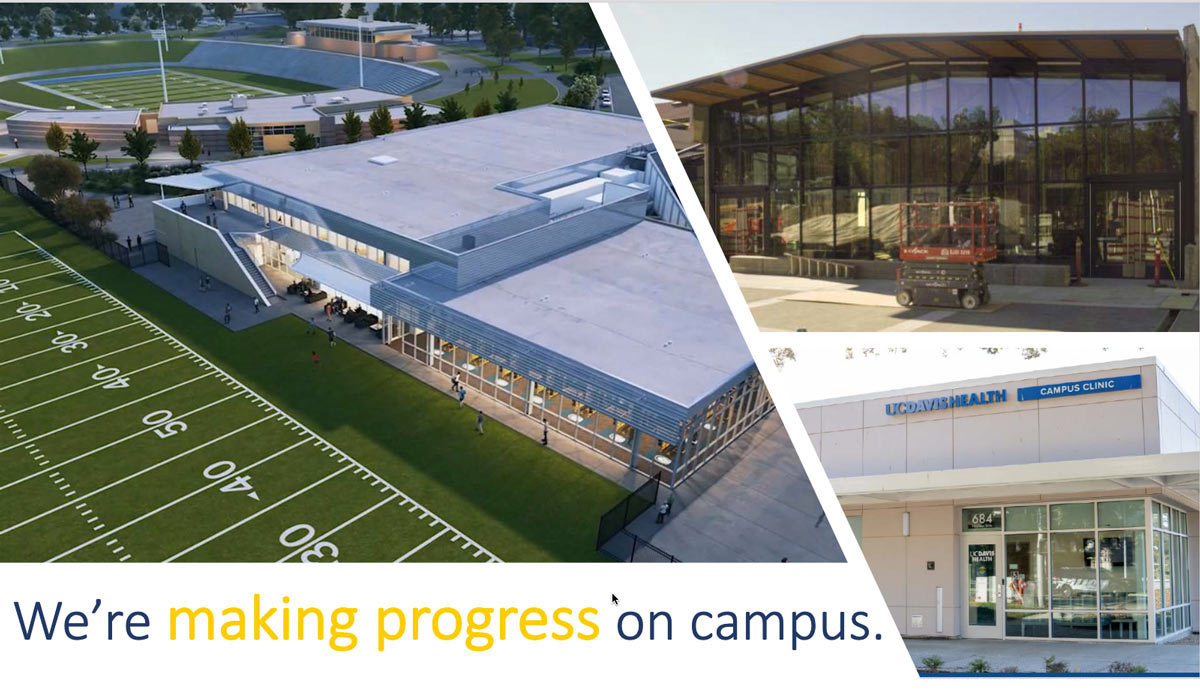
Despite much of the slowdown due to the pandemic, construction has remained active on campus. In fact, there’s an inside joke that UCD stands for “Under Construction Daily.”
The limited population on campus has actually been a benefit, as there are fewer inconveniences with construction projects.
In recent news, construction was completed on Walker Hall. Building tenants at its Graduate Center are moving in soon and we expect it to open to the public in the fall.
We also held a virtual open house for UC Davis Health’s Davis Campus Clinic, which opened in December on Hutchison Drive. This $7 million project reinforces our commitment to taking care of our UC Davis family. That includes our talented students, faculty, staff and the Davis community as a whole.
Also, we expect the Edwards Family Athletics Center will be completed in the summer of 2022. This is a state-of-the art athletics hub for our student-athletes, coaches and teams. This $55 million project is being brought to life thanks to the generosity of multiple donors.
Aggie Square
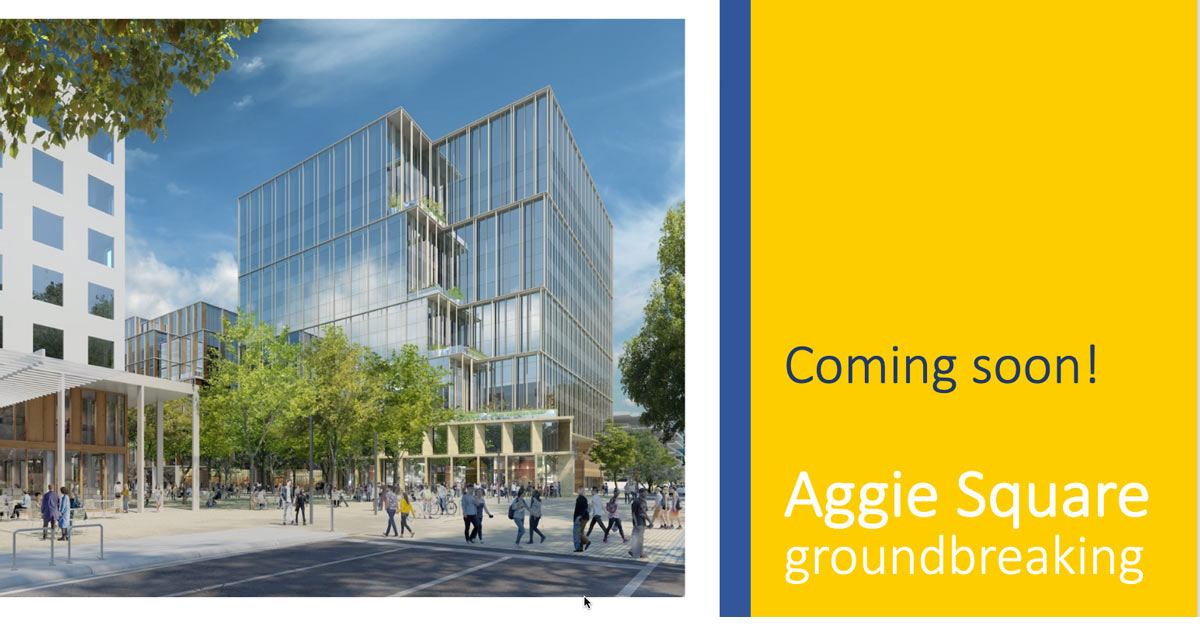
Back in Sacramento, we have good news as Aggie Square continues to make significant progress. This is our 25-acre innovation hub on the Sacramento campus.
We partnered with Wexford Science & Technology to design, finance, construct, own and manage the first phase of Aggie Square. They have a track record of success with projects like this.
In late-October, the Sacramento City Council voted unanimously to adopt a resolution of intention to establish the Aggie Square Enhanced Infrastructure Financing District. This is a tremendous step forward and would help fund the improvements needed for Aggie Square.
A few weeks later, the UC regents approved the project design and business terms. That keeps us on track to begin construction on Aggie Square this year.
We’re working to identify the initial occupants for Aggie Square, both from within and outside the university.
We’ve also undertaken a robust community engagement process from the beginning, including finalizing a community benefits agreement with the city of Sacramento. And we’ll continue these efforts with people in the surrounding neighborhoods and the city’s leadership.
Fall reopening
Now, I’d like to update you on the topic that’s defined our world for nearly a year: COVID-19.
As you know, we’ve been mostly in remote operations since March. This includes all lectures and the majority of discussion sections for undergraduate students and graduate students. Our staff are mostly working remotely as well.
During the fall quarter, fewer than 40 courses out of approximately 6,000 were offered for any type of in-person instruction.
Courses offered in person were those that were laboratory-based, performing or studio arts — or those required by professional or accrediting bodies to be offered in person. We used the same criteria for winter quarter.
I am happy to report that we will be able to offer about 100 courses in person during spring quarter, by also providing an opportunity for our graduating students to participate in small discussion groups. Our hope is to also phase in a few more courses with in-person instruction over the summer.
Given the development of COVID-19 vaccines and our outstanding asymptomatic COVID-19 screening test for all UC Davis faculty, staff and students, we are preparing for a return to in-person instruction in the fall. All of the other UC campuses are planning for this as well.
Last week, Provost Croughan established a Fall 2021 Planning Work Group. It is charged with developing plans for various scenarios in terms of instruction, campus activities, research and other core activities. It will also develop potential policy approaches in terms of remote work, students with medical conditions and other issues.
Like always, we will continue to communicate our plans as early as possible.
In the meantime, we continue to engage in a robust and innovative approach to testing the UC Davis community.
Since September 14, UC Davis has conducted more than 170,000 tests of asymptomatic students, staff and faculty. Throughout these past months, the positivity rate has remained quite low — often well under 1 percent.
Healthy Davis Together
Our rapid saliva-based testing program launched in September with students and university employees. It has since expanded to Davis residents through Healthy Davis Together. There are now three testing sites in Davis: at the Mondavi Center, the Davis Senior Center and most recently the Veterans Memorial Center.
We had seen what the pandemic was doing around the world — sickening and killing so many people. As federal and philanthropic funding became available, we saw an opportunity to reduce the spread of COVID-19 and help our university and city community stay as healthy as possible.
Healthy Davis Together includes public health messages, increased COVID-19 screening and other measures to encourage positive behaviors and lower the risk of spread. With this initiative, the word is definitely out that UC Davis is making a difference in the fight against COVID-19.
Conclusion
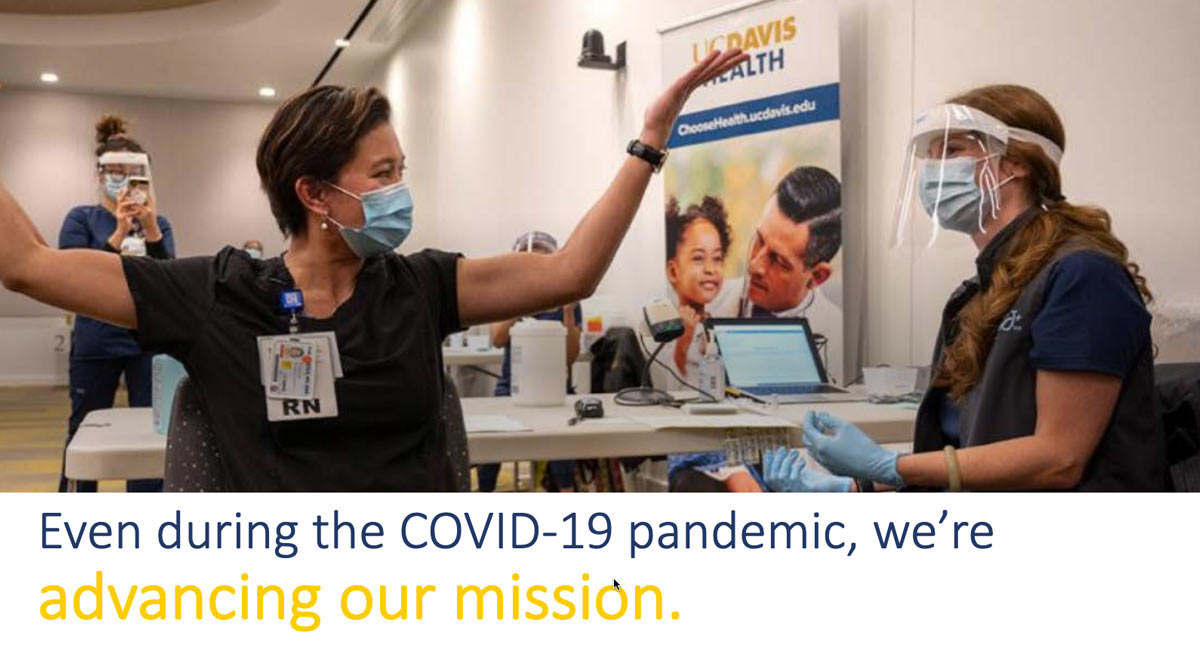
Let me wrap up by saying that we’re determined to succeed. In the midst of a pandemic, the value of UC Davis couldn’t be more apparent.
We see that in UC Davis receiving $20 million from the National Science Foundation to launch and lead a research institute that integrates artificial intelligence in food systems.
We see the excitement for students who want to study here. We’ve logged a record in applicants for our School of Medicine.
And we just set a record for applicants seeking to enter as freshman and transfer students in fall 2021. We received more than 105,000 applicants, an 11.7 percent increase over last year. Just incredible.
I’m looking forward to this year and all that we’ll accomplish. Of course, we will face challenges and many unknowns.
But I know this more than ever: UC Davis might be tested time and again, but no matter what, we continue to rise through the strength, talent and creativity in our university community.
I thank you again for your dedication to UC Davis, especially during these unpredictable and often trying days. I wish you and your loved ones the best of health, and look forward to the time we can all be in the same room together.